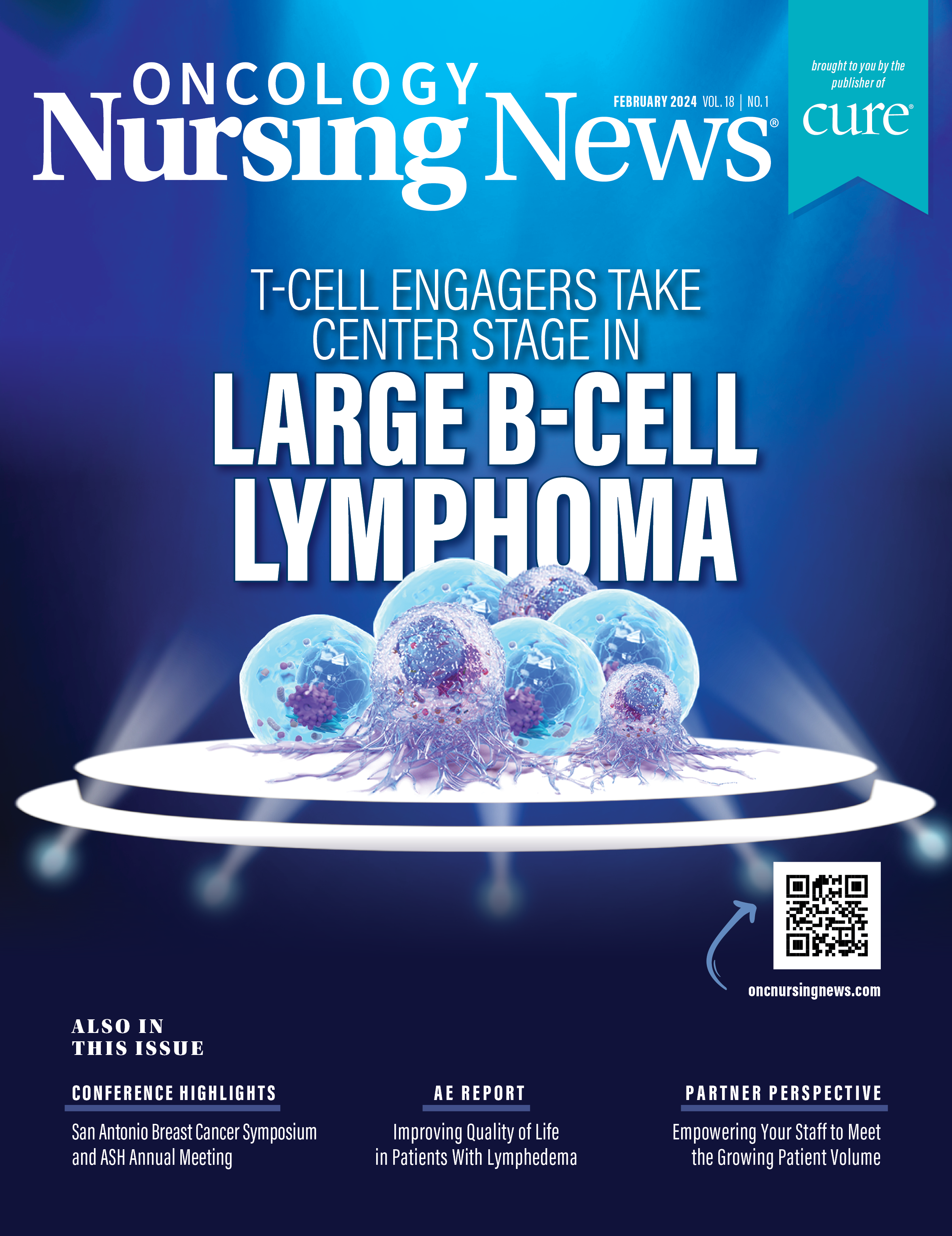T-Cell Engagers Take Center Stage in Large B-Cell Lymphoma
Bispecific antibodies that engage T cells are an effective treatment modality in relapsed/refractory disease and are an important new treatment for relapsed large B-cell lymphoma.
Diffuse large B-cell lymphoma (DLBCL) is a curable disease, and a standard first-line treatment is the combination of R-CHOP (rituximab [Rituxan], cyclophosphamide, doxorubicin hydrochloride, vincristine sulfate, and prednisone). Approximately 60% of patients are cured with R CHOP chemotherapy. For 35% to 40% of patients, the disease will be refractory to this approach.1 Relapse after first-line R-CHOP chemotherapy has been a clinical challenge and historically was treated with platinum-based salvage chemotherapy regimens with limited long-term overall survival. In 1995, the PARMA trial established high-dose chemotherapy followed by autologous stem cell transplant (ASCT) as the standard of care for people who had relapsed lymphoma that responded to salvage chemotherapy.2
Results of a recent meta-analysis showed that intensive chemotherapy followed by ASCT results in a 2-year progression-free survival rate of 54%.3 However, there are limitations to ASCT. Many patients are ineligible for ASCT because of their age, comorbidities, or insufficient responses to salvage chemotherapy.4 Moreover, more than 50% of patients with relapsed or refractory B-cell non-Hodgkin lymphoma experience relapse following ASCT.
Laura J. Zitella, MS, RN, ACNP-BC, AOCN

“The standard of care for diffuse large B-cell lymphoma has been R-CHOP for more than 30 years, and approximately 60% of patients are cured with R-CHOP,” Laura J. Zitella, MS, RN, ACNP-BC, AOCN, explained in an interview with Oncology Nursing News. “If the disease relapses, the standard of care, historically, has been to do additional chemotherapy and autologous transplant. Autologous transplant can cure approximately 30% more cases in the relapsed setting. However, many patients with relapsed disease have lymphoma that is not chemotherapy sensitive. So this is not an option that works well for a good number of patients.” Zitella is a hematology/ oncology nurse practitioner at UCSF Medical Center in San Francisco, California.
Chimeric antigen receptor (CAR) T-cell therapy has been an exciting advance that can induce deep and durable responses in patients with relapsed lymphoma.4
“Over the past few years, we have seen the development of CAR T-cell therapy, which is a type of T-cell therapy where we collect the patient’s T cells and engineer them with a special receptor called the chimeric antigen receptor that targets an antigen on the lymphoma cell,” Zitella said. “We reinfuse those cells, and those cells expand and travel throughout the entire body and eliminate the lymphoma cells. This approach has been incredibly successful.”
Zitella explained that CAR T-cell therapy is now the standard of care for patients who have B-cell lymphoma that is refractory to upfront chemotherapy or who have relapsed within the first year, because that type of lymphoma tends to be resistant to chemotherapy. In addition, it can be used as third-line therapy for people whose lymphoma relapses after auto SCT. However, CAR T-cell therapy is only available to patients at highly specialized treatment centers and some patients do not have access to this type of therapy. In DLBCL, patients who have had at least 2 lines of therapy face a poor prognosis.1 Third-line treatments approved for DLBCL include antibody-drug conjugates such as loncastuximab tesirine (Zynlonta), tafasitamab (Monjuvi) with lenalidomide (Revlimid), selinexor (Xpovio), and CAR T-cell therapies such as axicabtagene ciloleucel (Yescarta), tisagenlecleucel (Kymriah), and lisocabtagene maraleucel (Breyanzi).1
“Additional targeted agents [in the fourth line setting] are needed for patients whose lymphoma relapses after CAR T-[cell] therapy or who are not candidates for [it],” Zitella said.4
Enter the Bispecifics
To that end, investigators have sought to optimize bispecific immunotherapeutic agents that target both tumor cells and T cells in patients with hematologic malignancies.4 These emerging drugs are known as bispecific antibodies, and there is increasing excitement surrounding their use across many different hematologic malignancies, including in DLBCL.4
“Bispecific antibodies are antibodies that generally have at least 2 antigen binding sites. One binding site is to the antigen of interest on the cancer cell. In lymphoma, that is usually CD19 or CD20,” Zitella said. “The other antigen binding site is to CD3, which is a T-cell marker. It is a very elegant design, where these antibodies bind to the T cells, as well as the cancer cell, and bring the T cell to the cancer cell to destroy it.”
She added, “The bispecifics are generally used for third-line therapy, where we have historically had limited treatment options. This has made a huge difference in terms of extending the life of people who have lymphoma that has not responded to chemotherapy, autologous transplantation, and/or CAR T-cell therapy.”
In May 2023, the FDA granted accelerated approval to epcoritamab-bysp (Epkinly) for the treatment of adult patients with relapsed/refractory (R/R) DLBCL, including DLBCL arising from indolent lymphoma, and high-grade B-cell lymphoma following 2 or more lines of systemic therapies.5 Then in June 2023, the FDA granted accelerated approval to glofitamab-gxbm (Columvi) as a fixed-duration treatment for patients with R/R DLBCL not otherwise specified or large B-cell lymphoma arising from follicular lymphoma after 2 or more lines of systemic therapy.6
Martin Hutchings, MD, PhD

According to Martin Hutchings, MD, PHD, the science behind these treatments dates back more than 60 years. “The concept of [bispecific antibodies] is not a new one. Their potential was proposed already in the 1960s, and the ability of [bispecific antibodies] to trigger redirected T-cell killing of tumor cells was demonstrated in 1986,” said Hutchings, who is a staff specialist in the Department of Hematology at the Finsen Centre, Copenhagen University Hospital, in Denmark.
The approval of epcoritamab was supported by findings from the phase 1/2 EPCORE NHL-1 trial (NCT03625037), in which 148 patients with CD20+ DLBCL demonstrated an overall response rate of 61% with the T cell engaging bispecific antibody. This included a complete response rate of 38% and a median duration of response of 15.6 months.5
The decision to approve glofitamab was largely based on findings from the phase 1/2 NP30179 study (NCT03075696). The findings revealed a 56% overall response rate (95% CI, 47%-65%) among patients with relapsed or refractory disease (n = 132), including a 43% (95% CI, 35%-52%) complete response rate and an 18.4-month median duration of response (95% CI, 11.4-not estimable). Thirty percent of participants had received prior CAR T-cell therapy, and 83% were refractory to their most recent therapy.6
At the 2023 American Society of Hematology Annual Meeting and Exposition, researchers that a median duration of CR among patients treated with glofitamab was 26.9 months.7
“The CD3/CD20 [bispecific antibodies] are arguably the most active single drugs ever tested in DLBCL, and [they are] likely to change the DLBCL treatment landscape in the years to come,” Hutchings said.
Nursing Considerations
The 2 approved agents have not yet been compared in a head-to-head trial, so providers cannot say whether one bispecific antibodies is better than the other, Zitella explained. Regardless, nurses should be aware of differences in the agents’ administration.
“Either bispecific antibody is appropriate in the third line, but epcoritamab is a subcutaneous bispecific antibody, whereas glofitamab is an intravenous infusion,” she said. “Both require step-up dosing, which means that you start with a small dose and then the subsequent doses are a little bit higher and a little bit higher until you reach your treatment dose. Lastly, both [bispecific antibodies] require hospitalization, but epcoritamab requires hospitalization on cycle 1, day 15, and glofitamab requires hospitalization on cycle 1, day 8.”
Cytokine release syndrome (CRS) is the toxicity most important to monitor when caring for patients receiving bispecific antibodies, occurring in between 40% to 70% patients.8
Different management strategies may be implemented to reduce the incidence of CRS. For instance, corticosteroid prophylaxis and step-up dosing during the first treatment cycle are used in all CD3/CD20 bispecific antibodies treatment administrations.8
Patients who receive glofitamab require a single dose of the monoclonal anti-CD20 antibody obinutuzumab (Gazyva). This depletes circulating B cells, helping to reduce the risk of severe CRS.8
“Both epcoritamab and glofitamab require premedication to prevent CRS, and both have a risk of CRS and neurotoxicity similar to CAR T-cell therapy. However the risk of CRS and neurotoxicity is much lower than [that of] CAR T-cell therapy,” Zitella said. “Another important difference is the way that trials were designed. Glofitamab is a time-defined therapy, meaning that you receive glofitamab every 21 days for 12 cycles and then stop. Whereas epcoritamab is a continuous therapy that continues until disease progression.”
In addition, there is a risk of cytopenias, which is manageable with growth factors and/or transfusions.8
The Patient Impact
Zitella concluded by sharing an instance in which a bispecific antibody helped her patient achieve better quality of life. This patient’s disease had recurred after months of chemotherapy. She underwent CAR T-cell therapy, but she had many complications related to CAR T-cell therapy treatment, which required her to stay near Zitella’s institution in San Francisco, keeping her away from her home in Idaho.
“She was transfusion dependent and initially required daily platelet transfusions because she had been so heavily pretreated with chemotherapy and had little bone marrow reserve,” Zitella recalled. "She also had many complications, including pulmonary aspergillus, that required intensive monitoring,” Zitella said.
Initial scans showed a complete remission after CAR T-cell therapy. However, 5 months after the therapy, when she was finally recovering and feeling better, a surveillance scan showed a small recurrence in the abdomen. “At this point, the lymphoma was considered not curable,” she said. “But we wanted to offer her something that would allow her to live her life as long as possible and as well as possible. She wanted to return home to Idaho and see her family and friends, without being tied to our CAR T-cell therapy center,” Zitella said.
They have since treated the patient with glofitamab, and she has been doing well with this therapy.
“Her initial scan showed complete resolution: The lymphoma is gone,” Zitella said. “She visits our center every 3 weeks to get her glofitamab, and in the meantime, she has been traveling to see family and friends and really enjoying time with her husband and her family and friends.”
References
- Dickinson MJ, Carlo-Stella C, Morschhauser F, et al. Glofitamab for relapsed or refractory diffuse large B-cell lymphoma. N Engl J Med. 2022;387(24):2220-2231. doi:10.1056/NEJMoa2206913
- Philip T, Guglielmi C, Hagenbeek A, et al. Autologous bone marrow transplantation as compared with salvage chemotherapy in relapses of chemotherapy-sensitive non-Hodgkin’s lymphoma. N Engl J Med. 1995;333(23):1540-1545. doi:10.1056/NEJM199512073332305
- Tian L, Li C, Sun J, et al. Efficacy of chimeric antigen receptor T cell therapy and autologous stem cell transplant in relapsed or refractory diffuse large B-cell lymphoma: a systematic review. Front Immunol. 2023;13:1041177. doi:10.3389/fimmu.2022.1041177
- Hutchings M, Mous R, Clausen MR, et al. Dose escalation of subcutaneous epcoritamab in patients with relapsed or refractory B-cell non-Hodgkin lymphoma: an open-label, phase 1/2 study. Lancet. 2021;398(10306):1157-1169. doi:10.1016/S0140-6736(21)00889-8
- Epkinly (epcoritamab-bysp) approved by U.S. FDA as the first and only bispecific antibody to treat adult patients with relapsed or refractory diffuse large B-cell lymphoma (DLBCL). News release. AbbVie. May 19, 2023. Accessed May 19, 2023. https://news.abbvie.com/2023-05-19-EPKINLY-TM-epcoritamab-bysp-Approved-by-U-S-FDA-as-the-First-and-Only-Bispecific-Antibody-to-Treat-Adult-Patients-with-Relapsed-or-Refractory-Diffuse-Large-B-Cell-Lymphoma-DLBCL
- FDA approves Genentech’s Columvi, the first and only bispecific antibody with a fixed-duration treatment for people with relapsed or refractory diffuse large B-cell lymphoma. News release. Genentech. June 15, 2023. Accessed June 16, 2023. https://www.gene.com/media/press-releases/14994/2023-06-15/fda-approves-genentechs-columvi-the-firs
- Hutchings M, Carlo-Stella C, Morschhauser F, et al. Glofitamab monotherapy in relapsed or refractory large B-cell lymphoma: extended follow-up from a pivotal phase II study and subgroup analyses in patients with prior chimeric antigen receptor T-cell therapy and by baseline total metabolic tumor volume. Blood. 2023;142(1):433. doi:10.1182/blood-2023-173951
- Hutchings M. The evolving therapy of DLBCL: bispecific antibodies. Hematol Oncol. 2023;41(suppl 1):107-111. doi:10.1002/hon.3154




